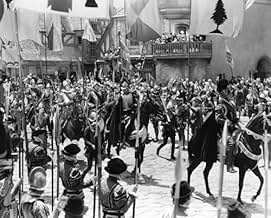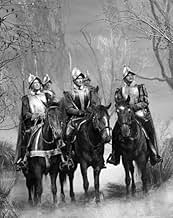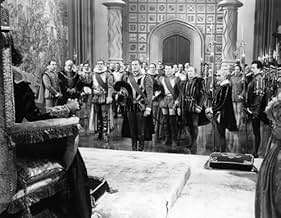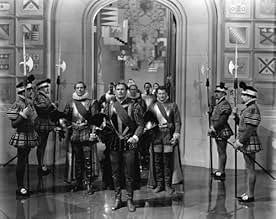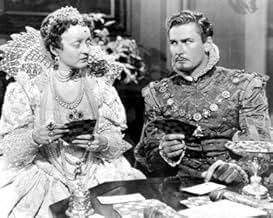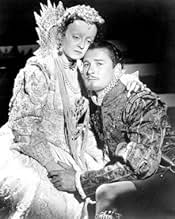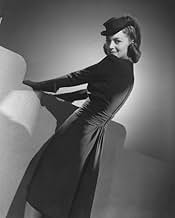Meu Reino Por um Amor
Adicionar um enredo no seu idiomaA depiction of the love/hate relationship between Queen Elizabeth I and Robert Devereux, the Earl of Essex.A depiction of the love/hate relationship between Queen Elizabeth I and Robert Devereux, the Earl of Essex.A depiction of the love/hate relationship between Queen Elizabeth I and Robert Devereux, the Earl of Essex.
- Direção
- Roteiristas
- Artistas
- Indicado a 5 Oscars
- 3 vitórias e 5 indicações no total
- Mistress Margaret Radcliffe
- (as Nanette Fabares)
- Lord Charles Howard
- (não creditado)
- Bit Part
- (não creditado)
- Majordomo
- (não creditado)
- Spectator Outside Whitehall Palace
- (não creditado)
- Handmaiden
- (não creditado)
- Direção
- Roteiristas
- Elenco e equipe completos
- Produção, bilheteria e muito mais no IMDbPro
Avaliações em destaque
Bette made no secret of her dislike for the freewheeling, womanizing, undisciplined Flynn, and criticized his performance opposite her for years afterwards (although if memory serves she eventually relented and admitted he wasn't bad). Some may take issue with the pacing of the movie, but Bette's so good, Errol's so handsome, and the dialogue so adult and refreshing (and don't forget the reliable villain Henry Daniell), you can't help but like it.
Nevertheless, when your biggest (and most headstrong) female star wants something, you GET it for her, so the rights were purchased, and ELIZABETH THE QUEEN was announced as 'prestige' production to be filmed with Davis as the lead. Then the problems began...
For the pivotal role of Robert Devereux, Earl of Essex, the ambitious lover who nearly costs Elizabeth her crown, Davis wanted Laurence Olivier, who, at 32, had already established himself as one of the finest actors on two continents. Darkly handsome, and renowned for his interpretations of Shakespeare, the future British lord had created quite a stir in Hollywood, aided by the fact that his lover was Vivien Leigh, who'd won the coveted role of 'Scarlet O'Hara' in GONE WITH THE WIND.
Unfortunately, Olivier was committed to play Heathcliff in the Goldwyn production of WUTHERING HEIGHTS. The search for a British actor of equal stature proved fruitless; Robert Donat was filming GOODBYE, MR. CHIPS (for which he'd win an Oscar), Leslie Howard was finishing GONE WITH THE WIND and in preproduction for INTERMEZZO, Ronald Colman was involved in THE LIGHT THAT FAILED, even Cary Grant was busy, shooting GUNGA DIN... ...But Errol Flynn, Warner's biggest male star, WAS available...
Davis had worked with Flynn a year earlier, in THE SISTERS, and it had NOT been a pleasant experience. Prone to taking things as easy as possible, and playing practical jokes on his co-stars, he took advantage of his classic good looks and natural charm to 'get away' with not knowing his lines and frequent tardiness (he was a world-class carouser and womanizer, away from the camera). Davis, who was always punctual, knew everybody's dialog, and could be quite temperamental, considered him unprofessional, and crude.
But Flynn had become a major star, and the WB, trying to insure ELIZABETH would be a success, overrode Davis' objections, and cast him as Essex...and Flynn immediately demanded a title change. He felt he was as big a star as Davis, and that the film title should reflect his status; so ELIZABETH THE QUEEN first became THE KNIGHT AND THE LADY, which Davis vehemently refused to accept, then THE PRIVATE LIVES OF ELIZABETH AND ESSEX, which she disliked, as well, but had to accept.
The filming was an unhappy affair. Both Flynn and Davis had difficulties with director Michael Curtiz, resulting in Davis' performance being 'over-the-top', and Flynn's so underplayed that he failed to grasp Essex's character, often appearing shallow. In one scene, Davis was supposed to slap Flynn; rather than do a 'staged' one, which would barely touch him, she hit him full force, wearing a heavy ring, which brought tears to his eyes, and broke, momentarily, his composure (the moment is in the completed film; watch, quickly, and you can see Flynn 'lose his cool'!) Flynn responded by a series of escalating practical jokes, with Davis threatening to kill him. Even co-star Olivia De Havilland was unhappy, having just completed GONE WITH THE WIND, and back at Warners in a decidedly secondary role. That the film 'worked' at all was a testament to Davis' perseverance, the glorious Technicolor-filmed sets, and Erich Wolfgang Korngold's spectacular musical score.
THE PRIVATE LIVES OF ELIZABETH AND ESSEX garnered mixed reviews for Davis (although she would be praised for how convincingly she portrayed the much older woman), and terrible ones, for Flynn (which would be used against him, in future, whenever he asked for more substantial roles).
Davis would again play Elizabeth, 16 years later, in the British production, THE VIRGIN QUEEN, but she never lost her resentment over the failure of the earlier film.
In a year of 'classics', THE PRIVATE LIVES OF ELIZABETH AND ESSEX would be an exception!
Davis hated working with Errol Flynn since doing The Sisters with him a year earlier. She was quoted as saying that when she had to kiss him she'd close her eyes and pretend it was Laurence Olivier. But I think Olivier might have had trouble making Essex a hero.
In point of fact he wasn't any kind of a hero. He was a vainglorious, conceited, egotistical cad of a human being who apparently only had talent in the bedroom. Now the bedroom part would have fit Flynn perfectly. But he became a military commander and leader and he bungled every job he was given.
The real Essex was played like a piccolo by the other members and rivals of the Elizabethan court. His main rival in the film is Robert Cecil played by Henry Daniell. In the film he is incorrectly identified as Lord Burghley's(Henry Stephenson's)son when in fact he was a nephew. Because it's Henry Daniell and he's a clever schemer he has to be the villain. In point of fact Cecil was a patriot in the best tradition. He was very concerned in fact about Essex's military ventures that they were nothing but missions of glory. Cecil's greatest contribution to English history was to come two years later when Elizabeth died, it's due to him that there was an orderly transition from the House of Tudor to the House of Stuart.
My favorite performance in this film is that of Alan Hale as Hugh O'Neill, the Earl of Tyrone who led the Irish rebellion against the English at that time. What happens in court to Essex with his rivals there is nothing compared to the way O'Neill plays him. He leads him deeper into the Irish interior, using hit and run tactics and then cuts him off from his supply base. And then in surrendering O'Neill very cleverly sows the seed of more dissension by telling him what a great leader he was and the Irish could never have beaten him if he'd been backed up better from home. And Essex the rube falls for it.
Another good performance is Donald Crisp as Sir Francis Bacon. He's a wily old fox used to court politics Elizabethan style. Bacon tries to give Essex some good advice none of which Essex accepts. In the end Bacon gives up on Essex and just switches sides, lest he be brought down with him.
So what we have here is Bette Davis giving a great performance with a leading man she detested and Flynn trying desperately to breathe life and heroism into a character who wasn't terribly heroic. It would have defeated a better actor than Errol Flynn.
In retrospect, one wonders why the praise. Probably because we have not produced many great serious dramatists. I imagine that five names might be pushed at the present: O'Neill, Miller, Williams, Albee, and Inge. Anderson is not revived. His use of blank verse, so impressive to Atkinson, seems pretentious to us. That and his stiff characterizations are major roadblocks to enjoying his work.
But he was flying high in 1939, when Warner Brothers purchased the film rights for ELIZABETH THE QUEEN for Bette Davis at Davis' urging. But she wanted Lawrence Olivier for Essex, and was given Errol Flynn, an actor she did not like to work with. Further, the title was changed (probably based on the Charles Laughton film THE PRIVATE LIFE OF HENRY VIII) to THE PRIVATE LIVES OF ELIZABETH AND ESSEX. Actually the original title is better and it is as ELIZABETH THE QUEEN that the film is remembered.
The finished film is actually a good historical work - basically taking the story of Elizabeth I and her last favorite to it's tragic conclusion. Flynn does capture the emotional instability of Essex, who chafed at being in his position of power only because he was the boy-toy of an aging, decrepit monarch. The play/movie makes the affection of the two real, but the actual reality suggests that Essex was more of a male chauvenist than he dared show until the very end. He was in contact with James VI of Scotland (the son of Elizabeth's dead rival Mary, Queen of Scots) about the coming change in regime. This is not covered in the film (and to be fair, Essex's rival Robert Cecil (Henry Daniell) was also in contact with James VI).
The achilles heel of Essex is his desire for glory, and what is fascinating in the film is how everyone plays on his weakness. Elizabeth tries to protect him from his follies, by giving him a high ranking title to keep him in London. But Cecil, his father Lord Burghley (Henry Stephenson), his rival Raleigh (Vincent Price) manage to goad him into leading an army in that permanent quagmire of Ireland. Finally his enemy Tyrone (Alan Hale Sr.) goads him (when he has been beaten) into returning to London and straightening out Elizabeth. Essex does do so. In real history, his men were defeated in the streets of London. In the film he does seize the palace, only to be manipulated by Elizabeth into disarming, and then is arrested for treason.
I don't think Elizabeth actually gave Essex a ring to return to her if he ever needed her help, but his death in 1601 on the headman's block at the Tower of London may have shortened her life. She died in 1603, still Elizabeth the Queen, but also a sad, lonely old woman.
Você sabia?
- CuriosidadesBette Davis had originally wanted Laurence Olivier for the role of Lord Essex, claiming that Errol Flynn could not speak blank verse well. She remained extremely upset about this through the entire filming, and Flynn and Davis never worked again together in a film. According to Olivia de Havilland, she and Davis screened the film again a short while before Davis suffered four strokes in 1983. At film's end, Davis turned to de Havilland and declared that she had been wrong about Flynn, and that he had given a fine performance as Essex.
- Erros de gravaçãoThe movie depicts Lord Burleigh being alive at the time of Essex's insurrection in 1601 however, Burleigh died in 1598.
- Citações
Queen Elizabeth I: And when he takes you in his arms again, thank heaven you are not a queen.
Mistress Margaret Radcliffe: But I thought to be a queen...
Queen Elizabeth I: To be a Queen is to be less than human, to put pride before desire, to search Men's hearts for tenderness, and find only ambition. To cry out in the dark for one unselfish voice, to hear only the dry rustle of papers of state. To turn to one's beloved with stars for eyes and have him see behind me only the shadow of the executioner's block. A queen has no hour for love, time presses, and events crowd upon her, and her shell, an empty glittering husk, she must give up all the a woman holds most dear.
- Cenas durante ou pós-créditosThe Warner Brothers shield is in the form of an English coat of arms. This logo was seen in Errol Flynn's previous film As Aventuras de Robin Hood (1938).
- ConexõesEdited into As Aventuras de Don Juan (1948)
- Trilhas sonorasThe Passionate Shepherd to His Love (Come Live With Me and Be My Love)
(posthumous 1599) (uncredited)
:yrics by Christopher Marlowe
Music by Erich Wolfgang Korngold
Played on piano by Erich Wolfgang Korngold and sung by Nanette Fabray
Principais escolhas
- How long is The Private Lives of Elizabeth and Essex?Fornecido pela Alexa
Detalhes
- Data de lançamento
- País de origem
- Idioma
- Também conhecido como
- La vida privada de Elizabeth y Essex
- Locações de filme
- Empresa de produção
- Consulte mais créditos da empresa na IMDbPro
Bilheteria
- Orçamento
- US$ 1.075.000 (estimativa)
- Tempo de duração1 hora 46 minutos
- Proporção
- 1.37 : 1
Contribua para esta página



